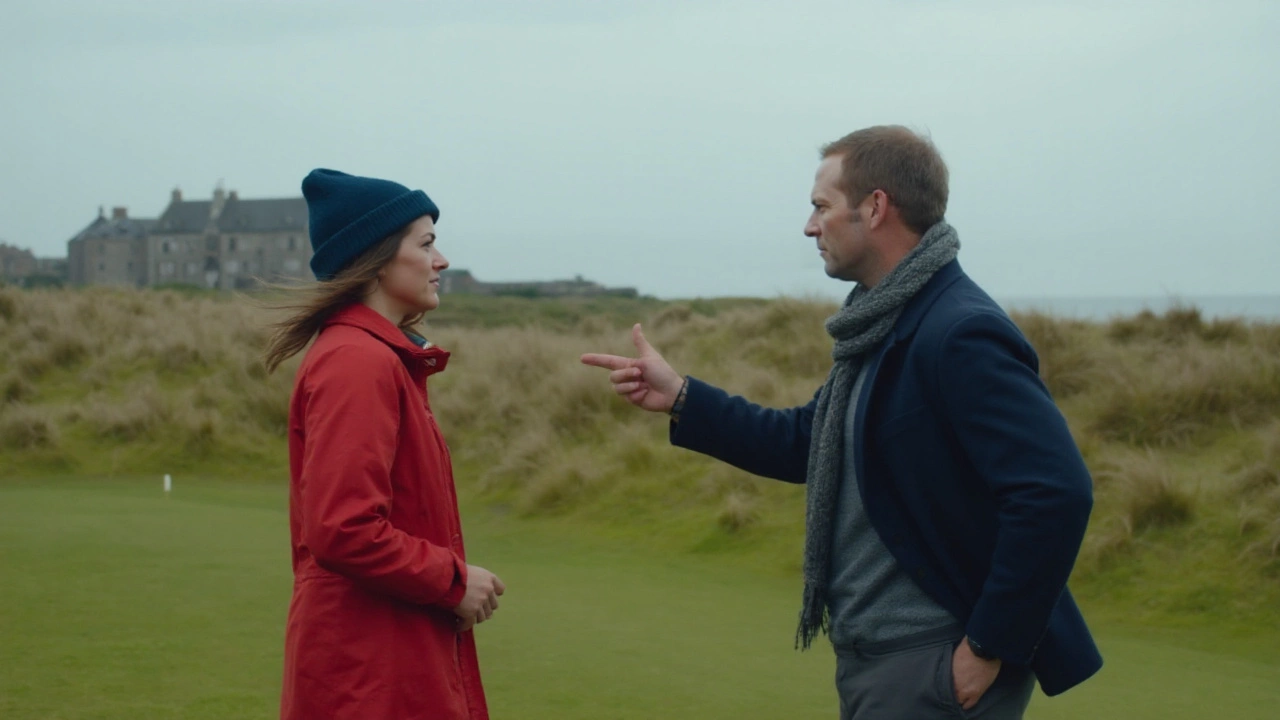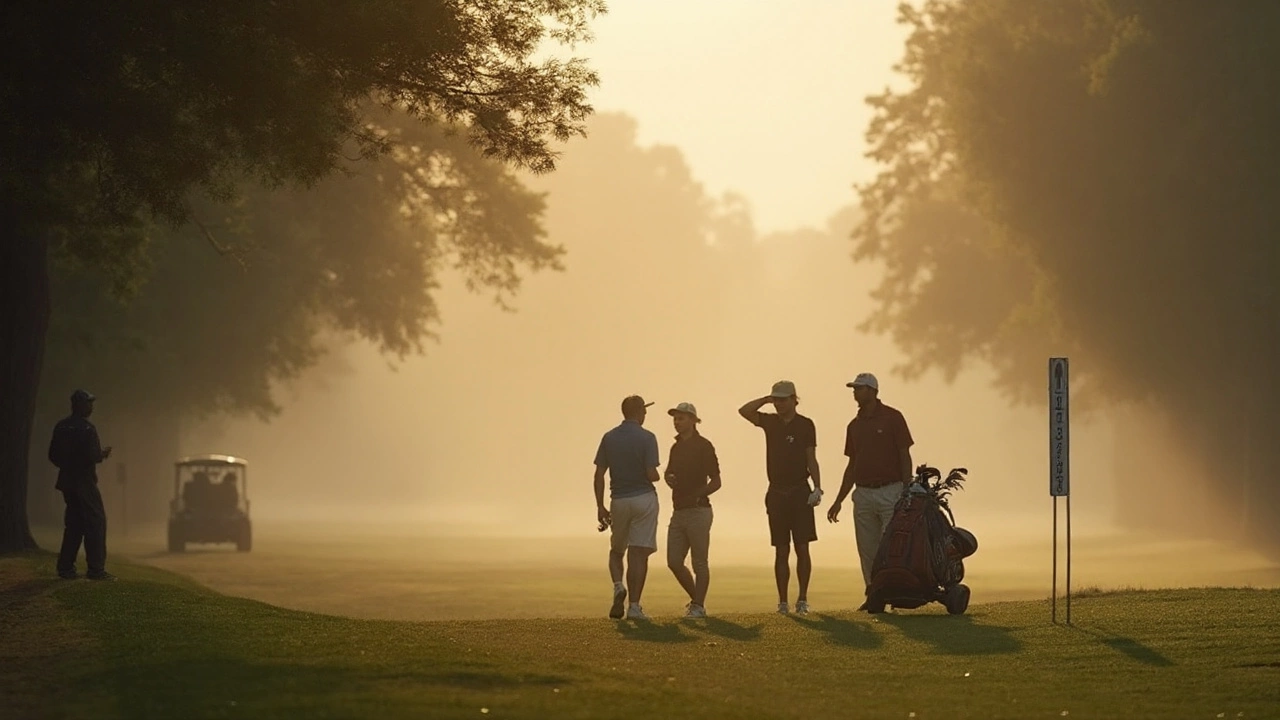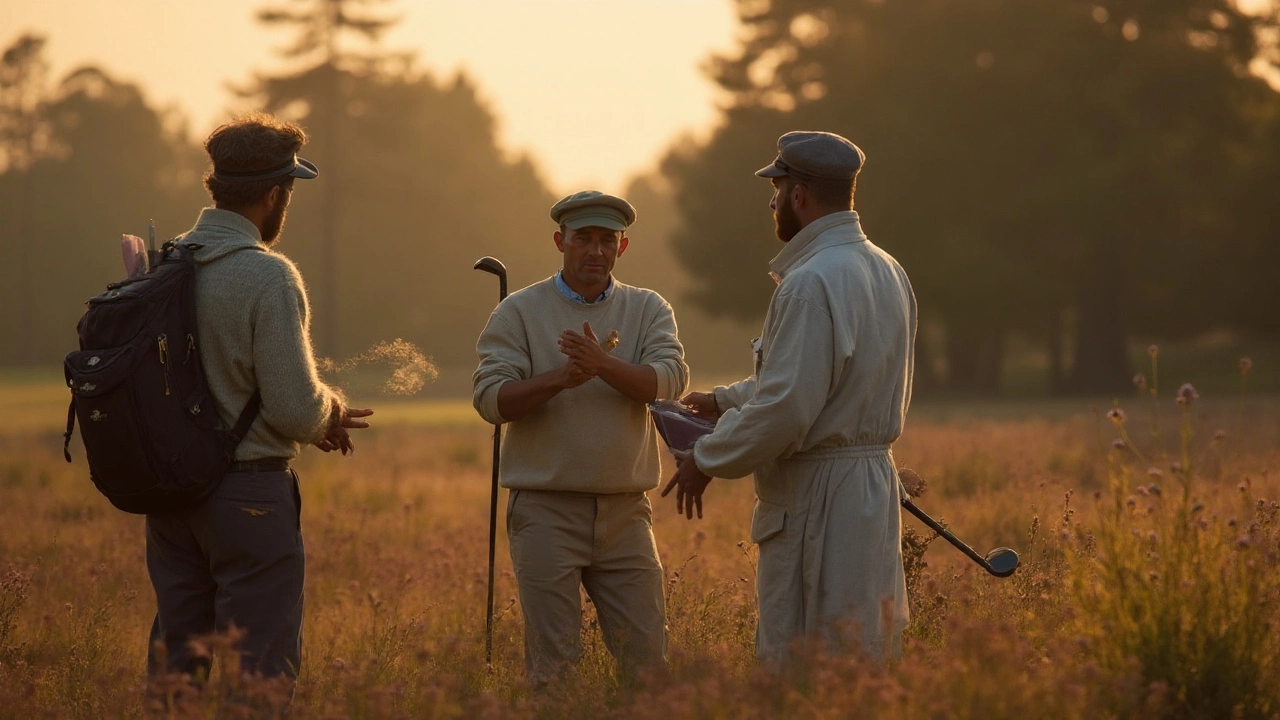
TL;DR
- Yes-asking “What club did you hit?” is advice under Rule 10.2 and earns the general penalty.
- Penalty: loss of hole (match play) or two strokes (stroke play).
- Exceptions: You may ask your partner or your caddie.
- You can observe a club by sight, but you can’t ask for it or signal to get it.
- Safe topics: distance, rules, public information (like flag location).
Your mate flights one pin-high into the wind. You blurt out, “Seven or eight?” That harmless chat can cost you two shots. Under the modern Rules of Golf, club choice is advice. Ask for it from the wrong person, and you’ve just taken the general penalty. Here’s what the rule actually says, how it plays out on course, and the smart ways to get info without getting dinged.
What the rule really says (no fluff)
Advice (golf) is any comment or action intended to influence a player in choosing a club, making a stroke, or deciding how to play a hole. Club selection sits squarely inside that definition, which is why asking for the club is treated as advice.
Rules of Golf (governed by the USGA and The R&A) put this in writing in Rule 10.2 (Advice and Other Help). Rule 10.2 says you must not ask for advice from anyone except your caddie or partner, and you must not give advice to anyone other than your partner. The penalty is the general penalty.
Two key formats matter for penalties. Match play applies loss of hole for a breach. Stroke play applies two penalty strokes. The logic is simple: asking about the club is intended to influence your play-so it’s advice.
Is it a penalty to ask what club someone hit?
Yes-unless you’re asking your own partner or your caddie. If you ask an opponent (match play) or a fellow-competitor (stroke play), you’ve breached Rule 10.2. You don’t need to get an answer to be in trouble; the act of asking is the breach.
Practical example: In a Saturday stroke comp, another player tees off first on a par 3. You say, “What did you hit there?” That’s advice. The moment you ask, you’ve earned two penalty strokes, even if they refuse to answer. In a pennant match, the same question to your opponent is loss of hole.
Now, if you’re playing four-ball and you ask your partner (golf)-legal. If you ask your caddie-also legal. Those are the two explicit exceptions in Rule 10.2.
What you can ask vs what you can observe
Rule 10.2 draws a clean line between advice and public information. Distance to the hole? Public. Wind direction? Public. Rules questions? Public. Club selection? Not public.
But here’s the twist: you can learn from observation. If you see the other player pull a 7-iron or spot the 7 stamped on the sole as they walk by, that’s not advice. No communication happened. You gained information by watching, which is allowed. What you can’t do is ask for that information or signal for it.
Interpretations to Rule 10.2 used by the USGA and The R&A make this explicit: asking “Was that a 7?” is advice; spotting the 7 without asking is fine. The same applies to clues like divot depth, launch, and spin-you can process them, just don’t solicit club data.
The penalties-spelled out
The general penalty is the hammer for this rule.
- Match play: loss of hole for the player who asks or gives advice unlawfully.
- Stroke play: two penalty strokes added to the player’s score on that hole.
In team formats, the breach usually applies to the player who asked or gave the advice, not the entire side, but be careful: in four-ball and foursomes, advice to or from your partner is fine; advice to or from the other side is not. Read your competition’s terms for any local twists.
Clear exceptions you can lean on
- Partner exception: Communicating club choice with your partner is allowed in side formats like four-ball and foursomes.
- Caddie exception: Your caddie can advise you on club selection all day.
- Public info: You can talk distance, elevation changes if measured, the Rules, flagstick status, and where penalty areas or bunkers are.
- Observation: You can use anything you can see or reasonably infer without asking-ball flight, sound, turf interaction, and yes, a visible club.
One more nuance: asking a spectator or a marshal what club another player hit is still advice because you’re seeking info to influence your play. The source doesn’t cleanse it-your intent matters.
Common on-course scenarios (and the right call)
Scenario 1: Par 3 into a headwind. Your fellow-competitor hits first and is tight. You start, “What clu-” Stop. Don’t ask. Instead, check the wind, your yardage, and their ball flight. If you happened to see the club, process it silently.
Scenario 2: Bunker shot. Your opponent takes a wedge and splashes to kick-in. They lay the club down near the rake. You see “58” on the sole. That’s observation-fine. Asking, “Was that a 58?” is a breach.
Scenario 3: Four-ball. Your partner hits a 6-iron to the back tier. You ask, “Was that a 6?” Totally fine-partner exception.
Scenario 4: Walking scorer or spectator blurts, “He hit 7!” You didn’t ask; they volunteered. You haven’t breached. But if you prompted it-“What club did he hit?”-you did.
Scenario 5: Practice round. You can share club info with anyone unless the Committee’s terms restrict it (rare). Just remember: the restriction bites once the competition starts.
Scenario 6: Range chat before the round. Asking, “What are you hitting from 150 today?” is fine before the round starts. Mid-round, same question equals advice.
Scenario 7: Looking into a bag. If the bag is open and you incidentally notice clubs, fine. But rifling through someone’s bag or moving covers to identify a club crosses into unreasonable actions and risks a different breach of etiquette or even Code of Conduct-don’t go there.

Quick comparison: allowed vs not allowed
| Scenario | Allowed? | Why | Rule Reference | Penalty (if breached) |
|---|---|---|---|---|
| Ask a fellow-competitor, “What club did you hit?” | No | Asking for club choice is advice | Rule 10.2 (Advice) | Two strokes (stroke play); loss of hole (match play) |
| Ask your partner the same question (four-ball) | Yes | Partner exception | Rule 10.2 | None |
| Ask your caddie what club to hit | Yes | Caddie advice allowed | Rule 10.2 | None |
| Observe the other player’s club without asking | Yes | Information from observation is not advice | Rule 10.2 (Interpretations) | None |
| Ask a spectator what club the other player hit | No | Still seeking advice to influence your play | Rule 10.2 | Two strokes / loss of hole |
| Share distance to the hole | Yes | Public information | Rule 10.2 | None |
| Ask if the flagstick is in or out | Yes | Public information | Rule 10.2 | None |
| Signal to another player to show their club | No | Communication intended to reveal club = advice | Rule 10.2 | Two strokes / loss of hole |
Why this matters tactically
Good players plan to avoid advice traps. They build a yardage chart, note wind on the warm-up tee, and keep a simple matrix: stock number, one-club up, one-club down. That way, they aren’t tempted to ask.
On shots where you’d love a nudge-say, a 145-metre downwind wedge-anchor your own process: yardage, lie, wind, temp, elevation, and your recent strike pattern. If your yardage book says pitching wedge is 130 to the number and you’re flushed, go 9-iron. Zero need to talk.
There’s also the psychology. Asking for a club reveals your uncertainty. In match play, that can pump up your opponent. Quiet confidence forces pressure the other way.
Related concepts that often get mixed up
Advice vs alignment help: Rule 10.2 also regulates other help. Your caddie can’t stand on or close to the extension of your line of play behind you once you begin taking your stance. That’s not “advice,” but it’s “other help” with its own penalty structure. Different issue, same rule number.
Equipment limits are separate. Conforming clubs and balls live under Rule 4, which has nothing to do with advice. You’re free to carry up to 14 clubs, change strategy mid-round, and ignore what anyone else is using-as long as you don’t ask them.
Committee terms can tighten things. Some events publish strict Codes of Conduct. If they say don’t seek info from spectators or volunteers, take it literally. Penalties can escalate beyond the general penalty if you ignore a Code.
Quick definitions (for clarity)
General penalty is the standard penalty: two strokes in stroke play or loss of hole in match play.
Caddie is a person who assists a player during a round, including carrying clubs, giving advice, and helping with strategy.
Partner (golf) is a player on the same side in forms of play like four-ball or foursomes.
Match play is a format where players or sides compete to win individual holes.
Stroke play is a format where the player with the lowest total strokes over the round or rounds wins.
Rule 10.2 is the rule that governs advice and other help during a round.
Rules of Golf are the code of play jointly governed by the USGA and The R&A and updated in 2019 and 2023.
How to get the same edge-legally
- Dial your carry yardages. A simple matrix (stock, smooth, hard) beats guessing.
- Watch ball flight and sound. A compressed 7-iron has a different audio signature than a flighted 9.
- Use conditions. If your 150 is an 8-iron calm, add one into the breeze, subtract one downwind.
- Make notes. If a hole plays a half-club short every week because of a rise in front, write it in the book.
- Ask legal questions. Distance to the front? Slope-coded number from your rangefinder? Flagstick in or out? Go for it.
If you remember one phrase, make it this: the golf advice rule bans communication about club choice with anyone except your caddie or partner. Observe anything you want-just don’t ask.
Connected topics to explore next
- Penalty guide by format: general penalty vs disqualification-when each applies.
- Four-ball quirks: what advice is allowed within a side and how penalties affect only one partner.
- Caddie rules in 2023 updates: alignment help and when standing behind is a breach.
- Rangefinders and distance-measuring devices: what settings are legal in comps.
- Code of Conduct: how Committees can add stricter standards at your club or event.

Frequently Asked Questions
Is it a penalty to ask what club someone hit?
Yes. Asking a fellow-competitor or opponent what club they used is advice under Rule 10.2. The penalty is the general penalty: two strokes in stroke play or loss of hole in match play. You may ask your own partner or caddie without penalty.
Can I look at another player’s club without asking?
Yes. Information gained from observation is allowed. If you simply see the club-on the ground, during the swing, or as they walk by-that’s fine. The breach occurs when you ask for or prompt that information through communication.
Does it matter if the other player refuses to answer?
No. The act of asking is the breach. You can incur the penalty even if no answer is given. The other player should decline to avoid risking their own breach by giving advice.
Is it okay if my partner tells me what club they used?
Yes. Communication between partners is allowed in formats like four-ball and foursomes. Your caddie can also give club advice. Just don’t involve opponents or fellow-competitors in that exchange.
Can I ask a spectator what club another player used?
No. Seeking that information from any person other than your caddie or partner is still asking for advice. The source doesn’t matter; your intent to influence your play does. That’s a breach of Rule 10.2.
What if someone volunteers the club without me asking?
If you didn’t ask or prompt the info, you haven’t breached. However, the person who provided the advice (if they are a player in the competition and not your partner) could be penalized for giving advice. Best practice: stop unsolicited advice immediately.
Is distance information always allowed?
Yes, distance is public information. You can share yardages and ask about them. If distance-measuring devices are allowed by the Committee, you can use those too, provided any prohibited features (like slope, if restricted) are switched off.
What’s the penalty for repeated advice breaches in stroke play?
Each separate breach carries the general penalty (two strokes). A serious breach of the Code of Conduct or repeated misconduct could also trigger Committee action beyond Rule 10.2, up to disqualification, if specified in the terms of the competition.
Do the 2023 rule updates change anything about asking for the club?
No. The 2019 and 2023 modernizations did not change the core concept: asking another player about club selection is advice and penalized. Exceptions for partners and caddies remain.
Authoritative sources: The R&A’s and USGA’s Rules of Golf (Rule 10.2 Advice and Other Help), including official Interpretations clarifying advice vs public information and permissible observation.